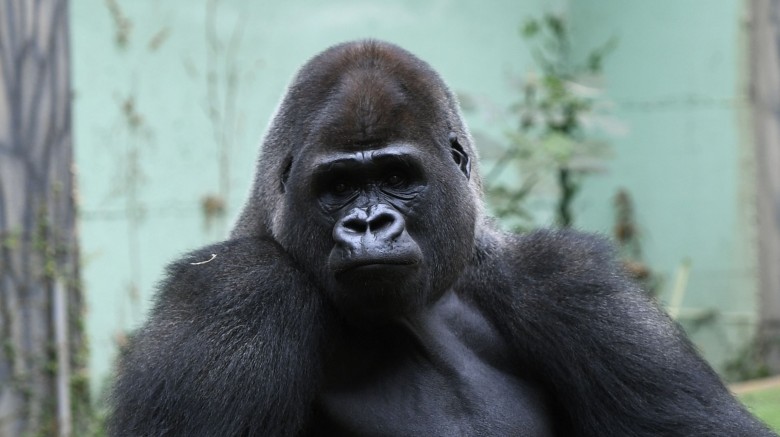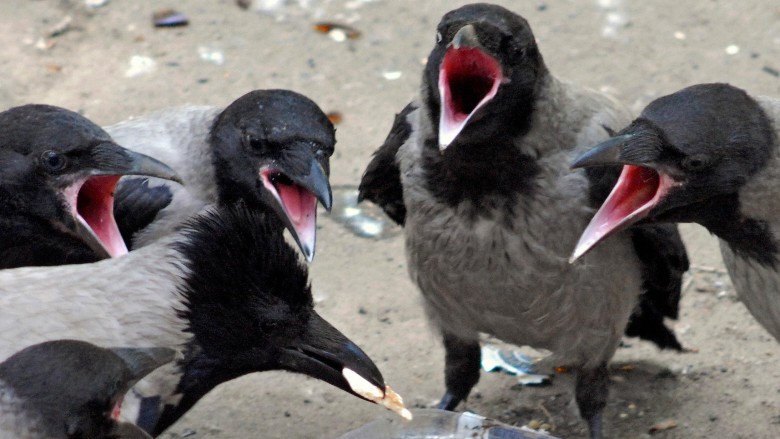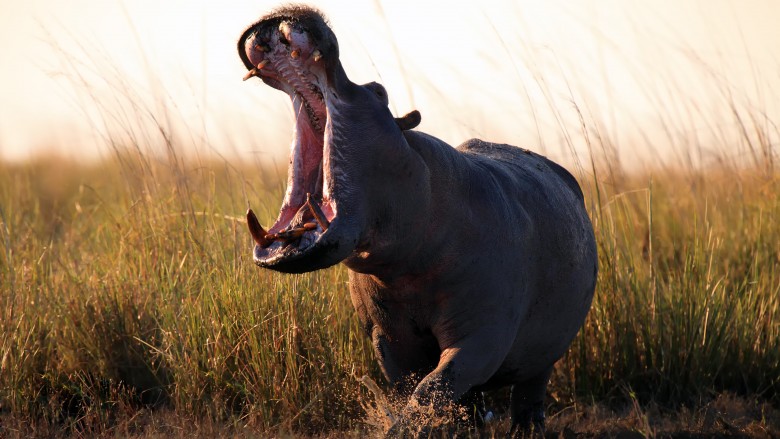Animals Poised To Take Over The World
As the only living creatures on Earth with both opposable thumbs and rocket launchers, humans are pretty much the undisputed rulers of the animal kingdom and are perched firmly atop the food pyramid. Alas, though, being in such a lofty spot means that humanity is in a prime position to be toppled and replaced by another creature who simply wants it more. Here are some of the prime contenders for animals we think are poised to take over, if they ever got their act together and decided to try and take us on.
Great apes
Population: About 500,000
Main advantage over humans: Enhanced monkey strength and speed.
If Rise of the Planet of the Apes has taught us anything, it's that in the event that apes ever decide they're tired of humans being the top primate, they possess the numbers and strength to quickly neutralize a medium-sized city's police force by sending endless waves of gorillas to fly tackle their helicopters out of the sky.
On a more serious note, most great apes do possess strength greatly surpassing that of a human being and are more than capable of ripping a human arm, leg, or face clean off with their superior ape-power. Thought the exact strength level of an ape or chimp is difficult to pin down, experiments have shown that a single chimp can lazily pull more weight with one hand than a burly football player can with both. In addition, chimps and apes can outrun even the finest human athlete and possess the mental acuity to use basic tools to such a sophisticated degree scientists think some groups of apes have entered their own Stone Age.
Chimps in particular have been observed in the wild using advanced hunting tactics like stalking to hunt other apes, including their own kind, and even engage in what some have described as warfare. The most notable example of this was observed in a group of chimps in the Gombe National Park in Tanzania, who systematically invaded the territory of a rival chimp group just to attack their members enough that they'd die of their wounds. And just think about that for a second: if a chimp is strong enough to beat another chimp to death, imagine what it could to a soft, organ-filled human being if it was also armed with a large rock?
It's probably a good thing chimps and ape fight each other because if they ever turned their attention to us, they could probably take most of us out by hucking a few paving slabs at head height at a busy intersection.
Elephants
Population: About 500,000
Main advantage over humans: Never forgetting their enemies.
From a purely physical standpoint, elephants have us outgunned in virtually every way. A bull elephant in particular is pretty much a walking organic tank. Weighing as much as 6 tons with a bulletproof skull, sufficient strength to walk through a concrete building, and near-unlimited stamina, an elephant would almost certainly beat most of us in a fistfight. But wait, there's more because when breeding season rolls around, bull elephants enter something known as musth. When in musth, a bull elephant's body produces as much as 60 times more testosterone than normal, sometimes causing it to enter a Wolverine-like berserker rage where it attacks anything that crosses its path.
An infamous example of such an animal, and we're absolutely not making this up, was dubbed Osama Bin Laden and trampled an estimated 27 or so people to death in India between 2004 and 2006. Bin Laden the elephant was said to fear neither fire or the sound of a gun firing and was known to attack without warning, tearing people apart with his muscular trunk before stomping them into a horrific bloody puddle.
But here's the really scary part: elephants are known to be able to specifically recall and remember the accents and appearance of those who harm them or their kin. This means that along with possessing the ability to headbutt their way into any one of our homes and rip our arms off, elephants can keep a mental tally of anyone they feel specifically deserves it.
Crows
Population: 31 million in America alone.
Main advantage over humans: Group planning.
In a one-on-one fight, crows pose little threat to an adult human, but during the crow uprising, we wouldn't be fighting just one crow. We'd be fighting every crow in the entire world.
This is because crows are incredibly adept at working together to solve problems and keep each other informed about potential threats and danger. For example, the town of Chatham in Massachusetts had a crow problem that they tried to fix by shooting at crows with shotguns. In response, every single crow that passed over the town from that point on began to fly just outside of the range of shotgun pellets. When the town hired workers to scare them away, the crows learned to just turn up a minute after their shift ended. In short, the crows weren't having it, and they remain a constant problem in the town.
Along with this, crows have displayed an uncanny ability to recognize human faces, being observed attacking or harassing people who annoy them for the rest of their crow life after an initial confrontation, passing on the information to harass that person to other crows, as well as passing the information on to their offspring. So if you annoy a single crow, you may very well end up being harassed by its family and friends, forever. Crows also possess detailed geographical memories, allowing them to map out entire cities, making note of problem areas where crows have been attacked in the past.
Finally, crows have been known to attack frogs for no other reason than to eat their livers in a way that causes them to explode (the frogs, not the crows). So yeah, technically, if you annoyed a group of crows enough, there's sufficient evidence to suggest they could convince every other crow in a 100-mile radius to track you down and peck out your liver.
Spiders
Total population: About 25 million tons' worth.
Main advantage over humans: We're scared of them.
Research has shown that spiders exist in approximately 100 percent of American homes. We have no idea how many there are (hence why we estimate their number by weight), and they could conceivably eat every human being alive today and still be hungry.
According to a comprehensive estimation, the amount of meat consumed by the world's spider population in a single year is more than the entirety of the human race weighs. This means that if they all worked together, the spiders could eat every human alive in a few hundred days.
So to clarify, spiders are literally within a few feet of everyone reading this, outnumber us several dozen to one, and could devour all of humanity if they ever decided to team up. Good luck sleeping tonight.
Rats
Total population: Nobody is quite sure, but it's agreed they likely outnumber humans.
Main advantage over humans: Adaptability.
Few mammals are hardier or possess a constitution more iron-like than a rat. They can eat almost anything, thrive in near-toxic levels of filth, and can apparently chew through solid concrete. What makes rats truly dangerous though is their adaptability, specifically to the things we use to kill them.
In recent years, there's been a noticeable uptick in what have been dubbed "super rats," rodents seemingly resistant to, if not completely immune to, the conventional poisons used to kill them. This. combined with the breeding speed of rats. has resulted in millions of rats immune to the only effective way to kill them, becoming a huge problem for big cities the world over. Because of a lack of natural predators in a city environment, rats are also getting steadily larger, with specimens over a foot long becoming more and more common.
In the event that humans were ever wiped out or weakened to a point we couldn't retain our tenuous grasp on the top of the food chain, experts agree rats would "be the animals best suited to repopulate the world" in our stead thanks to their numbers and habit of eating our leftovers. Little did we know, pizza rat was just testing the waters for a full-scale invasion.
Ants
Total population: Some estimates say as many as 100 trillion.
Main advantage over humans: Hivemind.
From a certain perspective, it could be argued that ants live in a utopian society. Individual ants have no wants or desires, there's no conflict, and every individual of a nest works toward a singular goal, expanding the nest. Kind of the like the alien from Alien only real and somehow more dangerous.
Ants have no self-preservation instinct so will willingly sacrifice themselves when their nest is under attack, with one species of ant called the Malaysian ant taking this idea to its logical extreme by literally detonating itself using a chemical process to release a tiny cloud of poison into the surrounding atmosphere.
Don't let that fool you into thinking ants are dumb, though, because these tiny insects have been observed waging what can only be described as all-out war with each other. Far from using their sheer numbers to overwhelm opponents like you'd expect (though larger colonies sometimes do this), ants have been observed taking advantage of high ground to get a literal drop on an opponent, sending in soldier ants to finish off injured enemies, and even taking the larvae of defeated ants as slaves. Tactics vary from species to species, but a common thread is that they're often remarkably sophisticated due to their hive-mind mentality.
Fire ants in particular have demonstrated a rather terrifying ability to release a special pheromone that makes every ant around them sting at once. In practice, this allows fire ants to almost completely cover an unsuspecting creature before all biting at the exact same time. Fire ants are so dangerous that they've been known to eradicate all other life from an area they inhabit, either by killing them or making the others leave. As a final screw you to humanity, some species of ant can also lock their jaws together to create living rafts, so they can also, if the need arises, survive floods or deliberate attempts to drown them. Factor in that some ants possess a sting so painful it is likened to being shot, and that there exist super-colonies of ants described as being "poised to become a globally invasive species," and it's kind of surprising that they haven't take over already.
Hippos
Total population: Between 125,000 and 150,000
Main advantage over humans: Girth.
What hippos lack in numbers they more than make up for with size and ferocity. They're famously the most dangerous animal in Africa—nothing on the African Savannah is known to be stupid enough to even attempt to stand up to a hippo. With a mouth capable of exerting several tons of force in a single bite, hippos can, when angered, bite a crocodile almost in half by crushing with their gaping maw. Crocodiles are so scared of hippos that they will allow them to walk up to them while they're feeding and lick them. Scientists have no idea why the animal does this but haven't fully ruled out that hippos do it just because they can.
The skin of a hippo is about an inch thick in most places, making them largely bulletproof as far as most conventional weaponry is concerned. Poachers in the Congo are rumored to hunt them using rocket launchers. In addition to their considerable girth, hippos are surprisingly agile, being able to run at about 30 kilometers per hour (faster than most humans can run).
So to sum up, if they really felt like it, all the hippos could run in a straight line across a major population center, killing everyone, and the only way we'd be able to guarantee being able to stop them would be if we somehow found 150,000 rocket launchers before they reached the end.







